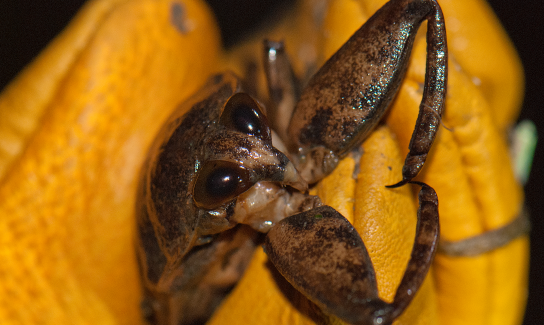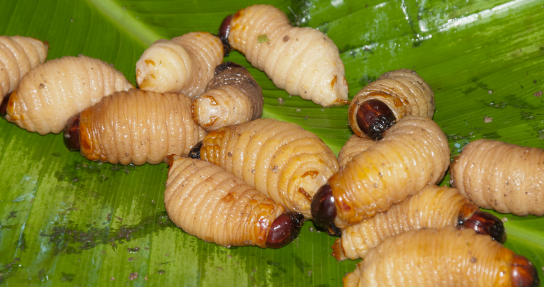By Dessa Bayrock (The Cascade) – Email
Print Edition: October 24, 2012
Competitive eating isn’t a new addition to the sports world; in a record set earlier this year, a contestant chowed down 68 hotdogs in 10 minutes. That’s a lot of bun and dog to scarf down in such a small time, and contestants train for months if not years to get to that skill level. How can a regular citizen gain bragging rights like that?
Apparently by eating bugs.
In a contest run by a Florida pet shop earlier this month, a man named Edward Archbold scarfed down dozens of worms, superworms and finally cockroaches to win the grand prize of a python. According to a Facebook post, the prize wasn’t what mattered, but the “glory” that would come with being a bug-eating champion.
The story ends tragically; Archbold won the contest, but began vomiting before he could be awarded his prize and died soon after. An autopsy report is expected in the next few weeks, but for the moment experts have very little idea why, exactly, he died.
Dr. Debbie Wheeler is UFV’s resident bug expert and teaches upper-level entomology as part of the biology department.
“General consensus is eating insects is not going to kill you unless you have an allergic reaction to them,” Wheeler explains, noting some people are allergic to insects the same way others are allergic to shellfish or peanuts.
The initial response to death-by-bugs may be to assume that the insects were contaminated with some kind of germ or disease, but Wheeler says the cockroaches Archbold ate were probably pretty clean.
“That’s certainly one of the issues if you’re going to eat insects in the wild, is that they can bio-accumulate herbicides, or they may have insecticides on them,” Wheeler says, “but I don’t think that’s the case here . . . [the pet shop] would have no need to spray them for anything.”
Although an incident like this gets a lot of press, Wheeler says insects are generally safe to eat and are currently a popular food source in 80 per cent of the world. In sub-Sahara Africa, for instance, the resources simply aren’t available to raise cattle or goats; people tend to eat what’s available, regardless of the creepy-crawly factor.
“There are lots of insects out there that are quite acceptable as food sources, and in fact are very good food sources: high in protein, low in fat, lots of minerals,” Wheeler explains. “And a lot of these things—like mealworms, crickets—people say once you cook them up, they do have a crunchy and very nutty taste.”
You can find an insect meal as close as Vancouver; Vij’s Rangoli offers roasted, spiced and ground cricket paranta (a kind of flatbread) with chutney for a mere $11. Similarly, a Fraser Valley chocolate specialty shop called Into Chocolate offers chocolate-covered insects and crickets at locations in Fort Langley and Cloverdale.
The other option, of course, is to look in your own backyard; Wheeler says almost any insect found in the wild is safe to eat if you’re lost and need food – as long as survivalists stay away from anything orange, black, or yellow.
“Obviously you want to avoid something that’s going to sting you, so anything black and yellow you probably want to avoid,” she explains. “I would tend to suggest to go for larval forms, so things like caterpillars, just because they’re much softer . . . anything with a crunchy exterior is probably going to lead to some kind of indigestion, because you’re not going to be able to digest the really hard parts.”
Even those who find themselves on the side of non-adventurous food should come to grips with the fact that they’ve ingested many insects over the course of their life, and will ingest many more.
“The funny thing is, we are all eating insects all the time whether we know it or whether we like it or not,” Wheeler explains with a grin. “If people were commonly allergic to insects like they are peanuts, we’d have a lot of problems with our food.”
“Nearly all of our food that’s gone through any kind of processing plant has insects in it,” she continues. “You won’t notice, you won’t see them, you won’t taste them – but they’re going to be in there.”
Personally, Wheeler says she tries to avoid eating insects, despite following her work to places like Ecuador where giant water bug larvae are considered a delicacy.
“I don’t eat whole organisms because I think it’s a bit disgusting to eat all of the digestive tract,” she says. “But obviously people have done it for centuries, and for the most part it’s not a problem.”
Archbold’s death remains a tragedy – but as people all over the world munch down on larvae, beetles and crickets, it’s probably not entirely the fault of the bugs. Insect, whether you like it or not, is a steady part of your diet and is probably going to stay that way.



